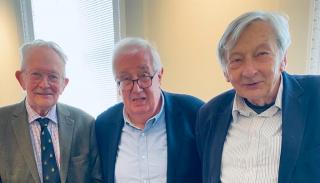
Breadcrumbs navigation
BISA at 50: Reflections and perspectives - Michael Cox
In the first of a new article series titled 'BISA at 50: Reflections and perspectives', Professor Michael Cox (LSE) takes us through his reflections of the Review of International Studies, memories of his peers Adam Roberts and Jack Spence, and his perspective on BISA's key achievements. Look out for further contributions to the series coming soon.
The three mature young men featured in this photograph taken at Chatham House in June 2023 all had walk-on parts in the BISA story over the last half century. My own role was a rather modest one, beginning in the late 1990s when, after a very lively 22 years at Queen’s Belfast, I was now safely ensconced at the "home of the discipline” in “Interpol” at Aberystwyth. Paul Taylor of LSE was about to give up editorship of the Review of International Studies (RIS), and after some to-ing and fro-ing which involved taking all the RIS archives by car from London to Aber (during which we were stopped by the traffic cops somewhere near Newtown!), I was duly appointed editor of BISA’s flagship journal alongside the legendary Ken Booth (former Chair of BISA and its first President) and Tim Dunne (now Provost and Senior Vice-President at the University of Surrey).
There were some very big boots to fill from Jack Spence (featured here on my right) through Roy Jones, John Vincent, Richard Little and of course Paul Taylor himself. But these were exciting days in which to become editor of the journal. The Cold War had only just ended. Nobody knew where Russia was heading. And China was only just beginning to make its presence felt. Then half way through my tenure, Al-Qaeda threw another large rock into the pond of international affairs and altered the United States and the Middle East forever.
These were indeed very different times to when both Jack (a South African) and Adam Roberts (pictured to my left) born in Cumbria with a life-long interest in peace and non-violence, ventured into the field in the 1970s. In those far distant days, the great contest between two ideologically opposed systems was still very much alive and about to get colder, and writers still referred to something called the ‘Third World’ navigating a path between the ‘superpowers’, one of which - the Soviet Union - then looked as if it was on the up, while the other, in the shape of the United States, appeared to be in deep trouble. As far as I can recall, nobody back then was predicting either the ‘end of history’ or the victory of liberalism (however short-lived that turned out to be!).
This is not the place to provide a full history of either BISA as an organisation, or indeed IR as an academic subject born out of the disaster that was the 20th century. But as Barry Buzan has pointed out in his seminal work on the institutional history of IR in Britain, BISA itself held its first official conference at Oxford in January 1975, with the journal being launched under Jack Spence’s editorship in the same year. Adam himself may not have been one of the founding “fathers” of the organisation – though one of his colleagues at the LSE, Susan Strange, most certainly was - but having secured positions first at the LSE and later at Oxford as the Montagu Burton Professor, he was, and remained, a key figure in the development of the subject over the next few years, becoming a regular speaker at BISA’s increasingly well attended annual conferences. In 2002 he was knighted in recognition of his ‘services to the study and practice of international relations’, and seven years later was appointed President of the British Academy.
Jack led an equally active academic life at Swansea, Leicester and later at King’s. He also maintained a close interest in, and retained strong links with South Africa, subsequently pulling together a number of essays through Chatham House (where Mandela actually spoke in 1996) first on South Africa after Mandela, and a few years later on how apartheid ended.
Jack also wrote the definitive study on South African foreign policy covering the 10 years between 1994 and 2004. In 1991 Jack was appointed Director of Studies at the Chatham House, followed thereafter by a lengthy stint as Academic Adviser to The Royal College of Defence Studies where he edited the Seaford House Papers. Jack was awarded an OBE in the Jubilee Honours List in 2003.
Looking back, as one is bound to, what in the end has BISA achieved over the past 50 years? The answer I think is a very great deal. But perhaps its most significant contribution has been to provide a hugely important collective forum, bringing together an increasingly large number of diverse students and established scholars - not only from Britain itself, but from around the world as well. It has been no small accomplishment.
Yet as we all know only too well, higher education in the UK (and elsewhere) faces some very testing times going forward. As Phil Baty of the THES has pointed out, with nearly 90 UK universities making redundancies, many involving the closure of whole departments, the road ahead is going to be a bumpy one to say the least. It will be up to BISA to make the case that in these dangerous times, when the world is facing more threats than at any time since the organisation came into being a half-century ago, we need IR more than ever.